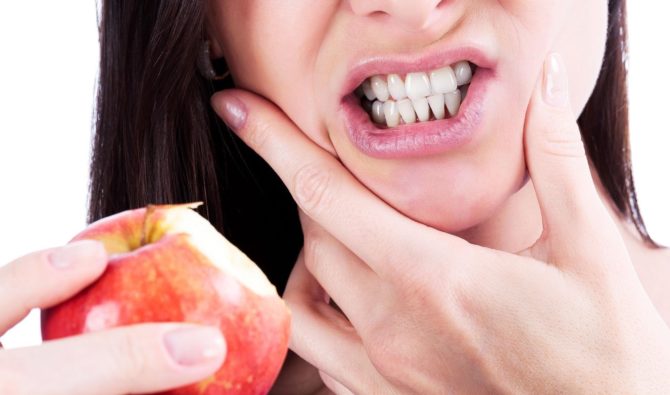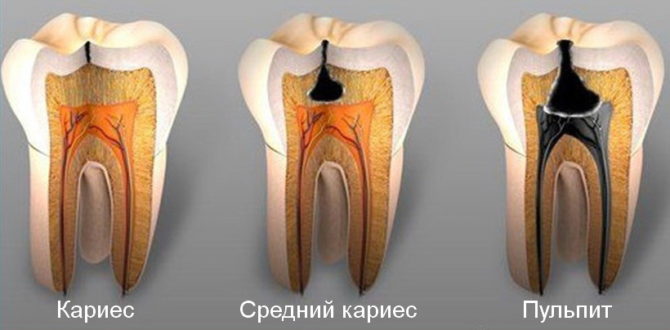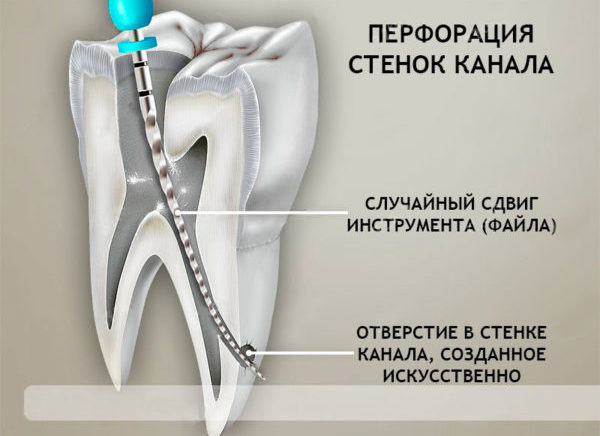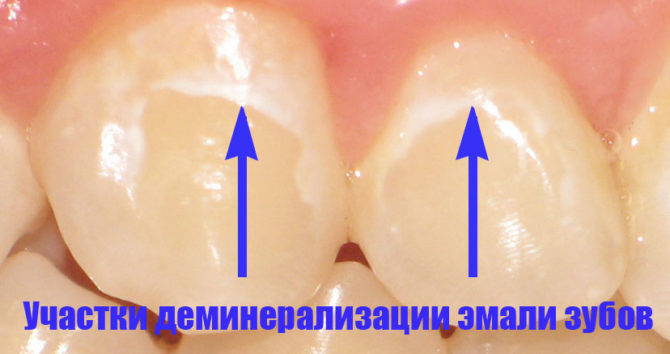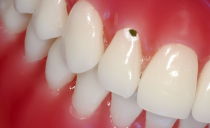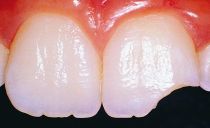Why does a tooth hurt when pressed, pressed and bitten
Toothache can cause a person incredible discomfort, because of which he can neither eat, nor speak, nor sleep. The pain syndrome can occur either constantly or only when pressed, and both the tooth itself and the gum above it can hurt. To get rid of an unpleasant symptom, you need to identify and eliminate the cause of its occurrence.that is possible only in dentistry.
Content
Reasons why it hurts to press a tooth
Pain with pressure on the tooth appears due to the following reasons:
- The inflammatory process in hard or soft tissues.
- Caries and its complications.
- Injury of the dentition.
- The size of the artificial crown or filling is too large, due to which the opposite dentition presses hard on the root.
- Consequence after depulpation and complication due to medical errors.
- Excessive sensitivity with thinning of enamel.
In most cases, it is impossible to determine the root cause of this condition and eliminate it without visiting a dentist, especially if the integrity of the crown is not compromised. The dentist should examine the oral cavity and, if necessary, refer the patient to an x-ray.
Inflammatory process
Depending on which part of the tooth inflammation has developed, such diseases and methods of their treatment are distinguished:
| Diagnosis | Symptoms | Treatment |
|---|---|---|
| Periodontitis - damage to the tissues around the root, which causes the destruction of cement and dentin. | The root of the tooth hurts when pressed, tapped on the crown, gum or nibble. In advanced cases, pus may be released, the tooth elevated above the dentition. | Cleaning, disinfection and filling of canals. |
| Pulpitis is a lesion of the internal soft dental tissues. | Pain when biting food, especially with a sharp taste and too high or low temperature. Discomfort intensifies at night. | In most cases, depulping is performed - the removal of the affected soft tissues and blockage of the canals using filling material. |
| Periostitis - damage to the maxillary periosteum with the formation of flux. | Gum swelling occurs, due to inflammation in the upper jaw, swelling under the eye may appear, on the lower - submandibular edema. | The doctor makes an incision on the gum and installs a drainage to drain the pus. |
| Periodontitis is a periodontal lesion due to which the tooth root is held in the jaw. With the progression of the disease, the tooth begins to stagger and falls out. | Initially, the symptoms are mild - only a slightly noticeable aching pain is possible. With the development of the disease, the gum between the teeth begins to hurt when pressed, pus is released, the tooth staggers and falls out. | Enhanced hygiene, surgical bone regeneration, anti-inflammatory therapy. With active reeling, the tooth is removed. |
| Pericoronaritis is a condition when the wisdom tooth does not erupt completely and is covered with a gingival hood, under which food accumulates and decays. | Pain in the gums when pressing on the hood over the tooth. | Most often, removal is carried out. |
Caries and its complications
The initial stages of caries development are hardly noticeable: the crown seems healthy, it does not hurt to press or bite. But over time, the pathological process is introduced into the deeper layers of enamel and dentin and spreads deep into the tooth until it reaches the pulp chamber.As this process develops, tooth sensitivity increases, and then pulpitis develops, accompanied by distinct pains.
To avoid problems with caries, you need to regularly take care of the cleanliness of the dentition and the entire oral cavity. Only prevention can eliminate the risk of serious complications. When carious lesions appear, an urgent appeal to a dental clinic is required. This disease is treated through thorough cleaning and filling of the carious cavity.
With the progression of the disease, when pressing a tooth there is severe pain, indicating damage to the pulp, it is necessary to do depulpation. The doctor puts a special poisonous substance in the artificially made tooth cavity that can kill the nerve, and after necrosis of the soft tissue cleans it from the pulp chamber and root canals. The doctor fills the resulting void with a special substance, and installs a seal on top.
Consequences of Depulpation
The depulpation procedure itself is also capable of provoking discomfort, which can drag on for a long time. When removing the pulp, a nerve is damaged, which provides the innervation of the entire dentition. This is one of the main reasons why pressing the front upper tooth can hurt, even if it is absolutely healthy.
Normally, discomfort after depulpation takes place in a short time - up to 5 days. If the discomfort is prolonged, intensified, shooting pains appear, a second visit to the dentist is necessary.
The reason for the development of complications after depulpation may be insufficient treatment of the channels with a disinfecting medicine, a stuck piece of the tool in the root canal or incomplete removal of the soft tissues of the tooth, due to which the remaining tissues begin to decompose.
To cure a tooth, the dentist has to re-open it, remove the remnants of the instrument or decaying tissues, treat the cavity with antiseptics and reinstall the seal.
Injury
Any violation of the integrity of the dentition quickly provokes pain. If enamel and dentin hard layers of the tooth are broken, its pulp, which contains the nerve, is exposed. The pain can be felt constantly, but most of all the tooth hurts when bitten, because the pulp is irritated from this.
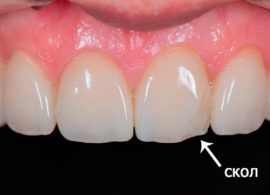 To get rid of toothache, which appears when you click on a damaged tooth, you need to restore its integrity. Small chips can be eliminated by sealing or installing linings, veneers. With more damage, you will need to install an artificial crown, which is fixed on a natural root or on a pin inserted into the canal or gum. If no measures are taken, an infection will fall into the damaged pulp chamber, and the pain will become even more painful due to the onset of inflammation.
To get rid of toothache, which appears when you click on a damaged tooth, you need to restore its integrity. Small chips can be eliminated by sealing or installing linings, veneers. With more damage, you will need to install an artificial crown, which is fixed on a natural root or on a pin inserted into the canal or gum. If no measures are taken, an infection will fall into the damaged pulp chamber, and the pain will become even more painful due to the onset of inflammation.
Injury is one of the main reasons why, when pressed, a completely healthy and whole-looking tooth starts to hurt. The explanation is simple: if a person breaks off a very small piece of the crown, he may not notice this, and the tooth will begin to decay.
Discomfort from crowns or fillings
Often, teeth begin to hurt when pressed after filling, when doctors make mistakes during the procedure: they use too much or insufficient amount of filling material, and poorly polish the surface of the fillings.
The process of filling, micro-prosthetics or prosthetics can be lengthy, and a tired person may incorrectly assess the closure of the teeth of the opposite jaw. Only upon coming home, when the muscle tension disappears, and the action of the pain medication ends, does the realization that a crown or seal interferes with a normal bite. Over time, the elevation of the crown over the dentition begins to be acutely felt, the pressure on it increases when chewing and even at rest - pain occurs.
If you experience pain during biting or tapping on a tooth that has been filled in, you should make an appointment with dentistry to grind and form a natural crown shape. If this is not done, increased pressure on the rising part of the enamel will lead to its destruction, and the soft tissues of the gums will become inflamed from excessive compression by the root.
The procedure for correcting the shape of the filling practically does not cause discomfort, but immediately brings relief, since the patient has the opportunity to put pressure on the tooth and close the jaw.
Over sensitivity
With insufficient supply of dental tissue with nutritious components, enamel gradually erases, which leads to thinning of the integument of the appearance of the tooth. When hard tissues lose their ability to protect the pulp from mechanical, chemical and thermal stimuli, increased sensitivity appears. That is why it can be painful not only to press a tooth with a finger or to press the tongue, but also to chew on it sharp, sweet, hot or very cold food. And in advanced cases, pain occurs even when inhaling cool air by mouth.
Enamel can regenerate naturally, but not with severe destruction. With excessive sensitivity, an integrated approach in the treatment of:
- Proper nutrition helps replenish the supply of nutrients that are necessary for the enamel layer strength.
- There are special treatment courses for remineralization, when the enamel is coated with varnishes containing the necessary elements.
With severe destruction of enamel and dentin, it is necessary to put an artificial crown or carry out micro prosthetics - the installation of ceramics or composite materials on the front surface of the tooth.
What to do if tooth aches when pressed
If there is pain when tapping on the tooth or biting food, you need to urgently visit the dentist. But before going to the clinic, you can take measures to eliminate acute symptoms:
- For whatever reason acute pain may arise, it can be eliminated by rinsing the mouth with a therapeutic solution of Furacilin, Chlorhexidine, sage broth or rinse with anesthetic effect.
- If the pain when biting on a tooth or at rest is too strong, you can take an analgesic or anti-inflammatory drug. It is advisable to consult with your doctor about which drug is preferred. Typically, in such situations, drugs like Nurofen, Tempalgin, Diclofenac are used.
- No matter why the tooth hurts when pressed, it can not be heated. It is forbidden to use local warming compresses, go to the sauna. If the cause of discomfort is infection, active suppuration may begin after exposure to heat.
A common mistake of patients who have pain in pressing a tooth is taking antibiotics without identifying the cause of the symptom and establishing a diagnosis. This can aggravate the condition, as the drug chosen at its discretion either does not work at all, or causes an intolerance reaction and side effects. Meanwhile, the normal microflora of the body will die along with the pathogenic, due to which the immunity will weaken and lose the ability to effectively cope with infections. It is desirable to know exactly the type of pathogen of the inflammatory process, so in some situations, patients are prescribed the delivery of bacterial culture from the separated pus.
If pain occurs when a tooth is pressed, it should not be tolerated and ignored, even if at rest there is no discomfort. The condition of the upper and lower dentition greatly affects the ability to eat, and an infection developing in the dentition can spread throughout the body. If the tooth starts to stagger, it can lead to its loss, which will ruin the aesthetics of the smile, especially when it comes to the front incisor.Whole and healthy teeth are only those people who care about their health continuously and go to the dentist at the first alarming symptoms.

